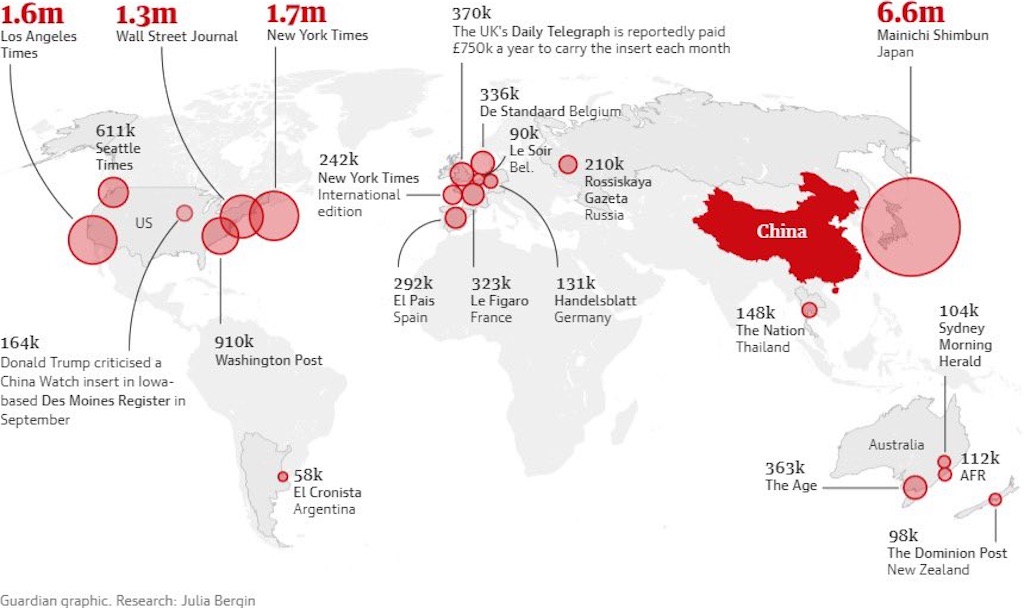Inside China's audacious global propaganda campaign. Mainichi Shimbun for Japan
Beijing is buying up media outlets and training scores of foreign journalists to ‘tell China’s story well’ – as part of a worldwide propaganda campaign of astonishing scope and ambition. by Louisa Lim and Julia Bergin Fri 7 Dec 2018 06.00 GMT
As they sifted through resumes, the team recruiting for the new London hub of China’s state-run broadcaster had an enviable problem: far, far too many candidates. Almost 6,000 people were applying for just 90 jobs “reporting the news from a Chinese perspective”. Even the simple task of reading through the heap of applications would take almost two months.
For western journalists, demoralised by endless budget cuts, China Global Television Network presents an enticing prospect, offering competitive salaries to work in state-of-the-art purpose-built studios in Chiswick, west London. CGTN – as the international arm of China Central Television (CCTV) was rebranded in 2016 – is the most high-profile component of China’s rapid media expansion across the world, whose goal, in the words of President Xi Jinping, is to “tell China’s story well”. In practice, telling China’s story well looks a lot like serving the ideological aims of the state.
For decades, Beijing’s approach to shaping its image has been defensive, reactive and largely aimed at a domestic audience. The most visible manifestation of these efforts was the literal disappearance of content inside China: foreign magazines with pages ripped out, or the BBC news flickering to black when it aired stories on sensitive issues such as Tibet, Taiwan or the Tiananmen killings of 1989. Beijing’s crude tools were domestic censorship, official complaints to news organisations’ headquarters and expelling correspondents from China.
China Media junks wi fi broadcast From the archives: Inside China’s audacious global propaganda campaign – podcast Read more But over the past decade or so, China has rolled out a more sophisticated and assertive strategy, which is increasingly aimed at international audiences. China is trying to reshape the global information environment with massive infusions of money – funding paid-for advertorials, sponsored journalistic coverage and heavily massaged positive messages from boosters. While within China the press is increasingly tightly controlled, abroad Beijing has sought to exploit the vulnerabilities of the free press to its advantage.
In its simplest form, this involves paying for Chinese propaganda supplements to appear in dozens of respected international publications such as the Washington Post. The strategy can also take more insidious forms, such as planting content from the state-run radio station, China Radio International (CRI), on to the airwaves of ostensibly independent broadcasters across the world, from Australia to Turkey.
Meanwhile, in the US, lobbyists paid by Chinese-backed institutions are cultivating vocal supporters known as “third-party spokespeople” to deliver Beijing’s message, and working to sway popular perceptions of Chinese rule in Tibet. China is also wooing journalists from around the world with all-expenses-paid tours and, perhaps most ambitiously of all, free graduate degrees in communication, training scores of foreign reporters each year to “tell China’s story well”.
Since 2003, when revisions were made to an official document outlining the political goals of the People’s Liberation Army, so-called “media warfare” has been an explicit part of Beijing’s military strategy. The aim is to influence public opinion overseas in order to nudge foreign governments into making policies favourable towards China’s Communist party. “Their view of national security involves pre-emption in the world of ideas,” says former CIA analyst Peter Mattis, who is now a fellow in the China programme at the Jamestown Foundation, a security-focused Washington thinktank. “The whole point of pushing that kind of propaganda out is to preclude or preempt decisions that would go against the People’s Republic of China.”
Sometimes this involves traditional censorship: intimidating those with dissenting opinions, cracking down on platforms that might carry them, or simply acquiring those outlets. Beijing has also been patiently increasing its control over the global digital infrastructure through private Chinese companies, which are dominating the switchover from analogue to digital television in parts of Africa, launching television satellites and building networks of fibre-optic cables and data centres – a “digital silk road” – to carry information around the world. In this way, Beijing is increasing its grip, not only over news producers and the means of production of the news, but also over the means of transmission.
Though Beijing’s propaganda offensive is often shrugged off as clumsy and downright dull, our five-month investigation underlines the granular nature and ambitious scale of its aggressive drive to redraw the global information order. This is not just a battle for clicks. It is above all an ideological and political struggle, with China determined to increase its “discourse power” to combat what it sees as decades of unchallenged western media imperialism.
At the same time, Beijing is also seeking to shift the global centre of gravity eastwards, propagating the idea of a new world order with a resurgent China at its centre. Of course, influence campaigns are nothing new; the US and the UK, among others, have aggressively courted journalists, offering enticements such as freebie trips and privileged access to senior officials. But unlike those countries, China’s Communist party does not accept a plurality of views. Instead, for China’s leaders, who regard the press as the “eyes, ears, tongue and throat” of the Communist party, the idea of journalism depends upon a narrative discipline that precludes all but the party-approved version of events. For China, the media has become both the battlefield on which this “global information war” is being waged, and the weapon of attack.
これは非常に大事な公開情報だが英ガーディアンが毎日新聞に中共の金が渡っていると名指しで報道した
しかも
毎日新聞は反論してない 毎日新聞は反論してない 毎日新聞は反論してない 毎日新聞は反論してない
毎日新聞は中共の手先 毎日新聞は中共の手先 毎日新聞は中共の手先 毎日新聞は中共の手先 https://t.co/0SmlwC7WXe
